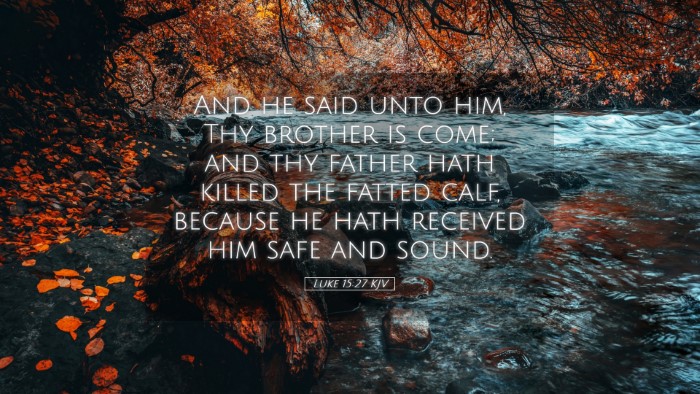Commentary on Luke 15:27
Luke 15:27 states:
“And he said unto him, Thy brother is come; and thy father hath killed the fatted calf, because he hath received him safe and sound.”
Contextual Overview
This verse is situated within the Parable of the Prodigal Son, which illustrates themes of forgiveness, redemption, and the boundless love of God for sinners. The parable speaks to both the wayward and the self-righteous, emphasizing that the Gospel is a message of grace extended to all, reflecting God's character as a loving Father.
Insights from Matthew Henry
Matthew Henry emphasizes the joy of reconciliation. He notes that the announcement made by the servant reflects not only the return of the son but also the deep affection the father holds for him. The killing of the fatted calf serves as a significant celebration of the son’s safe return. Henry suggests that this act signifies the abundance of grace and the joy in heaven over one sinner who repents.
Key Themes from Henry’s Commentary:
- The Nature of the Father's Love: The father's reaction demonstrates unconditional love, illustrating God's desire for relationship with His creations.
- Celebration of Restoration: The fatted calf symbolizes joyous festivities; God's grace invites us to share in His joy of salvation.
- Brotherly Relationships: Henry draws attention to the dynamics of familial relationships and the necessity of reconciliation within them, serving as a microcosm of the broader human condition in relation to God.
Insights from Albert Barnes
Albert Barnes offers a comprehensive analysis of the significance of the return of the younger brother. He points out that the servant’s message serves a dual purpose: it informs the elder brother of the joyful news and invites him to participate in the celebration. Barnes emphasizes the transformative power of forgiveness, drawing parallels to the Christian doctrine of repentance and acceptance.
Key Reflections from Barnes:
- The Role of the Servant: The servant acts as a messenger of grace, which reflects the role of believers today in sharing the good news of salvation.
- Invitation to Participation: The father’s actions invite both sons into a relationship marked by love, urging the elder brother to partake in the joy of reconciliation.
- Contrast of Responses: Barnes encourages readers to examine their own responses to God's grace—are we like the elder brother, harboring resentment, or like the younger brother, embracing reconciliation?
Insights from Adam Clarke
Adam Clarke delves into the cultural implications of the parable. He notes that the fatted calf was not merely an extravagant feast but a significant cultural gesture of honor and welcome. This celebration indicates the father's readiness to forgive and accept the returnee, demonstrating the depth of divine mercy and the impact of grace on communal relationships. Clarke provides a critical examination of the implications for both the elder and younger brothers.
Key Interpretations from Clarke’s Commentary:
- Cultural Significance: The act of killing the fatted calf signifies acceptance and the re-establishment of social order, as the family is restored.
- Divine Over Human Understanding: Clarke posits that the father's joy transcends societal norms and expectations, inviting readers to grasp the depths of God's love which defies human logic.
- Call to Unity: By celebrating the return of the younger brother, there is a divine call to unity and love—a reminder that all who return to God are welcomed, regardless of their past.
Theological Implications
This verse evokes critical theological reflections on the nature of God’s grace and the human response to it. The various perspectives provided by Henry, Barnes, and Clarke unite in underscoring the need for believers to embrace reconciliation and reflect God’s love in their interactions.
Importance for Pastors and Theologians:
- Model of Pastoral Care: The father’s response represents the ideal model for pastoral care, inviting the lost back into the fold with open arms.
- Emphasis on Mercy: The parable challenges pastors to emphasize mercy and grace in their preaching, moving beyond legalism towards a Gospel of acceptance.
- Encouragement for Believers: Believers are encouraged to be active participants in the joy of salvation and to mirror the father's love in their relationships.
Conclusion
Luke 15:27 encapsulates a profound moment in the parable, highlighting themes of love, forgiveness, and celebration. Through the insights of Matthew Henry, Albert Barnes, and Adam Clarke, a rich tapestry of understanding emerges, offering valuable lessons for Christians seeking to reflect God's grace in their lives. As students, pastors, and theologians explore this verse, they are reminded of the joyous invitation to embrace repentance and to rejoice in the restorative power of God’s love.


